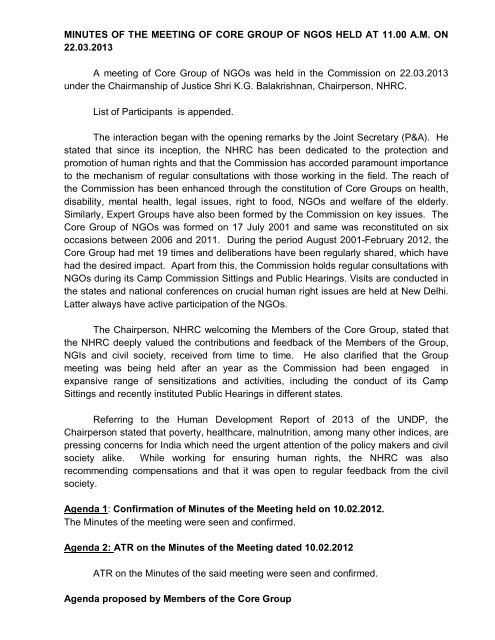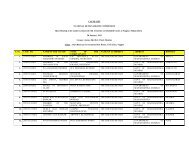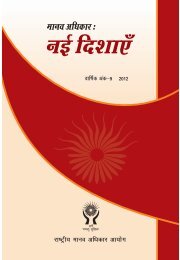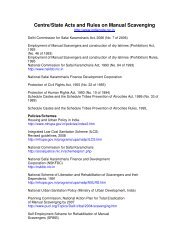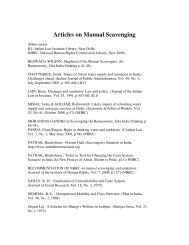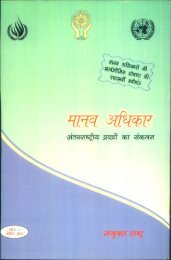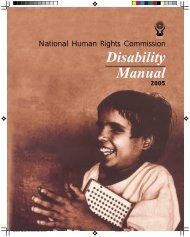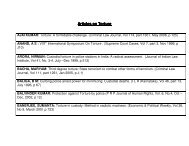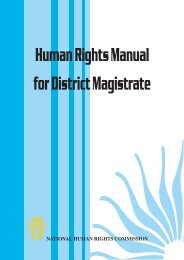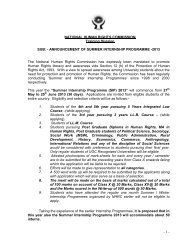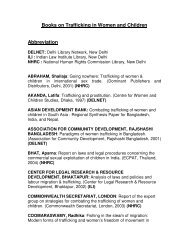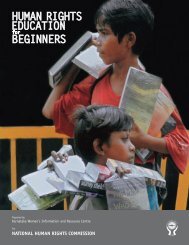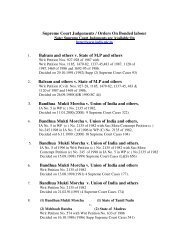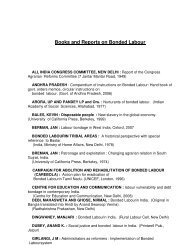MINUTES OF THE MEETING OF CORE GROUP OF NGOS HELD ...
MINUTES OF THE MEETING OF CORE GROUP OF NGOS HELD ...
MINUTES OF THE MEETING OF CORE GROUP OF NGOS HELD ...
- No tags were found...
You also want an ePaper? Increase the reach of your titles
YUMPU automatically turns print PDFs into web optimized ePapers that Google loves.
Agenda 3:Apart from supporting decision with regard to Agenda 2, Shri SuhasChakma of Asian Centre for Human Rights stated that ATR was verysatisfactory but in respect of continued hunger strike by Ms Irom ChanuSharmila, a Manipuri activist and Poet, fresh indulgence of NHRC was required .Even though the Finance Minister in his recent statement had opined that Armyneeded Armed Forces Special Powers Act (AFSPA). In his opinion, ameeting/public hearing by NHRC was required in view of large number of humanright violations in the State.The Chairperson NHRC took note of the concerns and stated that ameeting in Manipur was under consideration by the Commission.Agenda 4: Enactment of Prevention of Torture Bill, 2010:Reiterating his request, Shri Suhas Chakma mentioned that the presentLaw Minister was fully aware of the requirement. NHRC not only is requested toextend support but also help in organizing International Day for Solidarity with thevictims of torture on 26 th June, every year. The request was noted.Agenda 5:Maintaining/uploading of proceedings of NHRCShri Suhas Chakma stressed on his plea for maintaining/uploading theproceedings of the NHRC in cases/complaints of human right violations in thewebsite of the NHRC instead of the current practice of preserving the latestorder. In addition, he appreciated the fact that there was tremendousimprovement in handling of public complaints relating to human rights by theNHRC. But one prefers that all proceedings should be on NHRC website.Member (JBCP), however, was of the opinion that only importantproceedings should be displayed, which was agreed to.Agenda 6: Denial of access to file mercy petitions to the President of India.Shri Suhas Chakma did not want to have any discussion on the subject as hehad received a reply already.Agenda 7: Children living with mothers in Jail and visits to jail and legal aidto weaker sections:The issues raised by Dr. Lenin Raghuvanshi, Convener, PVCHR were takennote of. It was clarified that such issues were always reported upon by theSpecial Rapporteurs of NHRC and action was initiated with the help of StateGovernments by the NHRC from time to time. Member (JBCP) was of the viewthat a separate jail for women prisoners having children should actually solve allthe problems but same was not possible.
Ms. Puja Marwah of CRY further opined that all the guidelines of Supreme Courtand NHRC should be strictly followed by all the jails. Also, psychological needsof the inmates should be taken note of. Dr.Ruth Manorama, President, NationalAlliance of Women (NAWO) stated that in Andhra Pradesh and Karnataka suchproblems were rampant in jails. Shri Mathews Philip, Executive Director,SICHREM indicated that NHRC should give directions based on earlierguidelines to all the jails. Shri R.S.Chaurasia, Chairperson of Bachpan BachaoAndolan felt that a separate cell for women and children should facilitate thesolution.Dr.Ruth, in addition, brought forward the pathetic condition of Beggar Homes inKarnataka. It was affecting the health and hygiene of both mother and children.Intervention of NHRC was, therefore, required.The Chairperson, NHRC took note of issues raised in the Agendaitems 6&7 and decided to write a letter to all the Chief Justices. Apartfrom the need for ensuring legal aide, he reiterated the implementation ofguidelines of Supreme Court and NHRC in respect of conditions prevailingin jails.Agenda 8: Entertainment of complaints by NGOs at NHRC withoutauthorization by the victimsThis issue was explained in detail by Shri Baghmbar Pattanaik, Human RightActivist and Adviser, Odisha Goti Mukti Andolan. He supported his requestin the matter in view of the remoteness of the area wherein people suffer due tolack of adequate ventilation mechanism in the vicinity. As a result, in his opinion,valuable time was lost.Member (SP) did not agree to the proposal. Member (JBCP) however, feltthat adequate vigilance was required before taking cognizance and validity of suchcomplaints. He added that some NGOs were vigilant and responsible. Some,however, simply forward and forget. Sometimes, one cannot reach requiredconclusions for want of facts. However, press clippings received are alwaysexamined and taken cognizance of except the trivial ones.Shri Pattanaik appreciated the present stand of the Commission, more so,in regard to suo motu cases. Mr.S. Chakma expressed the view that a noticefrom NHRC to a person or an authority itself had a considerable impact. So theCommission should not restrict this measure. Shri Mathew Philip stated thatsometimes some complainants were being threatened, even then theircognizance by NHRC was appreciated. Dr.Ruth Manorama opined that theawareness that one can come to NHRC itself should be welcomed. NHRCtherefore, should not discourage it. After all, certain knowledge was also gainedin resorting to such an exercise. Ms. Puja Marwah of CRY supporting theagenda item expressed that every little piece of information matters for theoppressed sections. Sometimes a complainant has to walk a distance of 30 kmsto reach the nearest NGO for this purpose.
The Chairperson took note of the views expressed and stated thatthe Commission will do everything that was possible. However, oneshould not forget that sometimes authorities deny not only the contents ofthe complaints but also the involvement of the persons mentioned.Agenda 9: Negligence in prevention of violation by a Public ServantExplaining his letter addressed to the Commission on the subject. Shri B.Pattanaik,Advisor, OGA indicated that such complaints concerning publicservants were heard by the higher authorities due to initiative of NHRC but apartisan view was mostly taken due to which the public servant was savedfrom any accusation. He, therefore, suggested to NHRC to provide allsubmissions of the authorities to the complainant and hear him beforeadjudication, upload all proceedings of the case on the NHRCs website,upload the investigation and field reports, maintain electronic records beforeweeding out and not to close the cases containing recommendations forprosecution until the authorities bring the cases for consideration by the Judiciary.Shri M. Philip of SICHREM, in addition questioned the need for sanctionfor prosecuting even the retired public servants. Dr. Ruth Manorama addedthat even when compensations were awarded or recommended, NGOs haveto run from office to office with the victims and at times, dharna had also to beresorted to, leading to police action. In Karnataka as well as Tamilnadu,recommended relief was never paid in full. Mostly 30% cut was taken by theofficials, which justified taking up of such issues by the NGOs andprofessionals.Shri S.Chaka at this stage wished to know at what stage a matter couldbe considered sub-judice.Shri R.S.Chaurasia of BBA felt that old age pension amount had variedrates all over the country and that due to tremendous rise in prices, ratesshould be revised. NHRC should write to all the States. Dr.Ruth, supportinghis view point felt that minimum amount should be Rs.2000/-per person per month.Member (SP) felt that negligence by public servants were beingaddressed by the Commission while conducting hearings in respect ofSection 4 of SC/ST(PoA) Act,1989 as a result of which the officials werebecoming serious.Member (JBCP) indicated that public servants were over protectedas a result of which it was not easy to handle them. In relation to Subjudiceissue, he was of the view that the Commission, appreciating themerit of a case, proceeds even when police charge sheet is not filed.Commission could intervene, therefore, at any stage.Agenda 10: Intervention in legal proceedings with the approval of CourtShri B. Pattanaik,Advisor, OGA in support of his plea suggested thatNHRC should intervene in legal proceedings by submitting amicus curiae
iefs in cases brought under human rights legislation, intervene in legalproceedings by showing human rights considerations in all cases like “Rightto Acknowledgement” and appear in court to support orders for the enforcement of itsdeterminations.Registrar, NHRC stated that the Commission had the powers of a Civil Court.Under that summons and warrants were regularly issued in publicinterest. It would be advisable if not all complaints are forwarded to NHRC,rather, some were directly sent to SHRCs.Both Shri Pattanaik and Shri S.Chakma, however, felt that complaintsmade to NHRC were taken more seriously.Member (JBCP),opined that under the PHRA, 1993, the Commissioncan make recommendations only, which by and large, were accepted.The Chairperson NHRC stated that on important issues, theCommission was regularly intervening and that most of its recommendations wereimplemented.Agenda11: Illegal eviction of 5000 people at EWS Quarters,BangaloreDr.Ruth Manorama briefly explained the episode and requested forintervention of the Commission. Apart from immediate relief for the victims,she demanded conduct of a Public Hearing.Member (JBCP) indicated that the complaint was already before theCommission and notices were issued to the Chief Secretary. Furtheraction would follow, based on reply.The Chairperson stated that whatever was possible would be done,but it was necessary to hear from the State Government.ADDITIONAL AGENDABy Shri M.Philip, SICHREMNo.12- Pending cases of STF in KarnatakaIt was brought to the notice of the Commission that it had given its interimorders in 2007 regarding the case of victims of STF atrocities against thetribals of Karnataka. Shri Philip stated that the fact that compensation hadbeen awarded to the victims went on to confirm that human right violationshad been committed by the STF. However, individuals had not been heldaccountable for the atrocities, nor any punitive action was initiated againstthem. He suggested, therefore, that the case be reopened and a specializedinvestigative agency be given charge to further investigate the matter andascertain individual responsibility.The Commission stated that in such cases, assigning individualresponsibility may be difficult.
No.13 – Follow-up of National Conference on Human RightsEducation held on 14.12.2012.Shri Philip expressed the view that the said conference was an importantone and that every effort must be made to follow upon its recommendations.The Chairperson informed that the recommendations had alreadybeen sent to all the states for their consideration. It was agreed inprinciple to hold meetings with the Chief Secretaries of States and alsowith Secretaries of State Education Departments.No.14 – Amendments in Criminal LawSome of the Members expressed their concern over rising number ofunder-trial prisoners and indiscriminate arrests even in those offences wherea sentence below 7 years is prescribed. In their opinion, the Commissioncould do the needful.Member (JBCP) and Chairperson, opined that the matter was verycomplex. It was not only the question of giving guidelines, theGovernment should take steps to create additional jails,courts and fillup round about 300 vacancies in High Courts alone.No.15-Rescue and Rehabilitation of Missing ChildrenShri R.S.Chaurasia, Chairman BBA stated that the children rescued werenot getting the promised package and minimum facilities in respect of land,education and housing. There was a need for NHRC to intervene.No.16-General issues raised by Shri S.ChakmaShri S.Chakma felt that accountability on the part of NGOs wasvery much required and that both Government and NHRC may kindly ensureit. He added that 97% of them do not submit utilization certificates.No.17- Progress on declaration of District Courts as H R CourtsMiss Puja Marwah desired to know the progressMember (JBCP) and Chairperson stated that a Committeealready looking into the matter was expected to give its report by theend of April,2013. It will be shared with the Members of the Core Group.The detailed discussions were summed up by the Secretary General. Heexpressed the hope that active participation and feedback would be ensuredfrom the Members in future as well.The meeting ended with a vote of thanks to the chair.
List of ParticipantsNHRCJustice Shri B.C. Patel, MemberShri Statyabrata Pal, MemberDr. Ashok Sahu,Secretary GeneralSmt. Kanwaljit Deol,DG (Investigation)Shri A.K.Garg,RegistrarShri A.K.Shrivastava, Joint Secretary (P&A)Shri J.S.Kochher,Joint Secretary (Trg.)Shri A.K. Parashar,Joint Registrar (Law)Members of the Core Group of NGOsShri Suhas Chakma, Asian Centre for Human RightsShri R.S.Chaurasia, Bachpan Bachao AndolanShri Rakesh Jinsi, SOS Children’s Villages of IndiaShri Mathews Philip, South India Cell for Human rights Education & MonitoringMs. Puja Marwah,Child Rights and YouDr.Lenin Raghuvanshi, Peoples Vigilance Committee on Human RightsDr.Ruth Manorama,National Alliacne of Women, BangaloreShri Baghambar Patnaik, Odisha Goti Mukti Andolan


